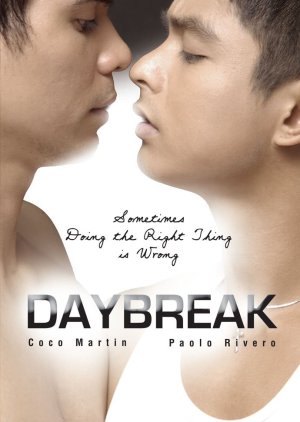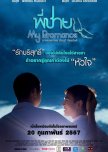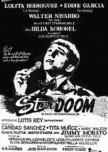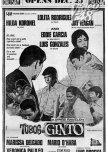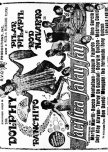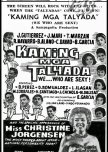
Decide to meet fate just the two of them? Both have already decided to look socially "tolerable" for relationships with women, but true love is here, between them. Neither of them belong to the Filipino poor, JP has a shop and William is moving to Australia. Or that JP would move in with him?
The film is originally 75 minutes long. The copy on YT is "only" 60 minutes long - did the hand of the censor intervene? But I rate the original film and the actors. Where the full 75 min is is a mystery to me, but if you watch other copies and not the shortened one on YT, these lines contain the cut scenes. But it's more about the beauty of the male body, erotically, don't expect any porn, which adds even more value to the film.
Questa recensione ti è stata utile?

The fear of commitment and the secrecy of a clandestine homosexual relationship
'Daybreak' (Tagalog: Bukang-liwayway) is a Filipino independent film of romantic genre and LGBT theme, directed by Adolfo Borinaga Alix, Jr., director of films such as '4 Days', 'Imoral', 'The Affair' and ' Porno', and series like 'Unlocked', among others.Released in 2008, the cast has only two actors: Coco Martin as JP, a handsome young man in his twenties, with a girlfriend, a boatman and tourist guide in Taal, Batangas, and Paolo Rivero as William, a married doctor, father of a family. , in a supposedly happy heterosexual marriage, who play a couple of men who have had a secret romantic bond for a year. After some time apart, they meet at a family vacation home in Tagaytay, Cavite, to maintain an intense sexual and loving relationship for one night before one of them goes abroad.
Almost two decades after its premiere, and after producing important works of the genre, the film shows fissures in its staging, like a preamble that is too long for a medium-length film, not so solid performances and filling the short time with shots of palm trees and clouds that show a poor resource due to the lack of ideas.
However, it is worth highlighting the use of lighting, especially interior lighting, where chiaroscuro underlines the state of mind of two men confronting their realities.
Personally, I liked the way the lights and cameras were directed towards the bodies of the two protagonists. By highlighting its sensuality, the viewer comes to fully understand that he is witnessing two people who love each other and are suffering from the imminent breakup.
And if on the one hand it may seem somewhat out of tune that it tries to claim a visible, touristy place beyond that, and not marginal, underground, so to speak, for gay relationships, adopting precisely the same forms as an independent romantic melodrama between heterosexuals On the other hand, it can be useful in helping to bring this reality closer to a conservative society, such as the Philippines, which considers homosexual relationships taboo, and which perhaps would otherwise be much more inclined to not accept the image of two men sharing bed, affections, kisses and confidences.
Supported by a script written by Charliebebs Gohetia, the film explores homosexuality and failed relationships, through a relationship with an expiration date.
This is not a work solely aimed at the gay public, as it addresses something as universal as love. But, it also speaks of the emotional undercurrents around the secrecy of an illegal homosexual relationship in the eyes of the family and the heteronormative and patriarchal society. Homosexuality and its representation are not a taboo to overcome, but the film ends up subtly revealing its vindictive nature by pointing the finger at the assumed homophobia in our behavioral protocols.
Always based on the margins of the independent Filipino homosexual film movement, the director, in his third film, shows interest in also investigating with images a frequent theme in homosexual relationships: he is married but in love with the other. The other wants it just for himself.
Both will live their last night as lovers, since William plans to leave for Australia. William wants to let it all go, but he doesn't know how to break the news to JP, who is already emotionally attached to him, even though they didn't actually have an agreement that they are actually a couple.
Various scenes and dialogues lead to the climax when JP is reluctant to accept the breakup. In the midst of conversations about their past, including evoking their happy and unforgettable moments, the evening passes, while they examine the photographs as the only witness of what they have experienced.
With a beautiful night as a backdrop, when their desire for each other dominates their minds and the conversations revolve around truisms and commonplaces, passion explodes and the two men make love as pleasant as ever. At dawn, William remains firm in his decision, leaving for Manila where he will take a plane to Australia, thus ending his relationship with JP.
In a single narrative time, with the intention of voyeurism, the film allows viewers to discover what happens when two men spend the night contemplating whether to break up or continue their relationship.
The essence of 'Daybreak' is not so much in the description of a romance with an expiration date but in the subtlety with which the director makes it emerge from the ellipses. The way it avoids or shows the sex scenes is exemplary. Intimacy begins to boil in the heat of confessions, memories, the risk of being surprised, the clandestine date in a secluded place of two people who face their loneliness, even though they are accompanied in the life that they have allowed others to know, hiding his true desires and passions from everyone.
Compared to the usual clichés of romantic cinema, be it drama or comedy, 'Daybreak' holds some appreciable surprises. Adolfo Borinaga Alix, Jr sculpts without artifice the ephemeral relationship of a love relationship between two young men. There are several sequences between the actors where a credible and deep intimacy is built, which serves to prepare the viewer for the ending announced from the first scenes and leave us, in the process, with a bitter taste in our mouths.
The narrative ellipsis that integrates the film and the ending with the characters, one driving his car on the road, and the other feeling alone, helpless in the middle of the house, still remembering the last night of love lived with the person he loves, puts The end of many homosexual relationships is evident: the fear of one of the two involved of commitment and a society that still discriminates against homosexuals.
Questa recensione ti è stata utile?

